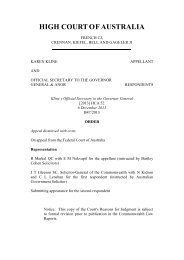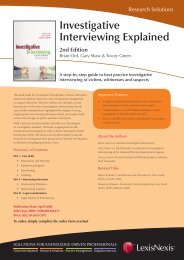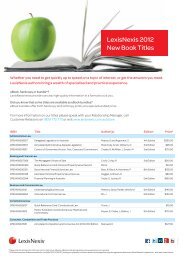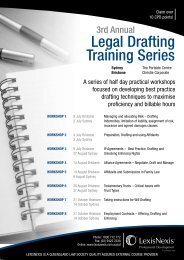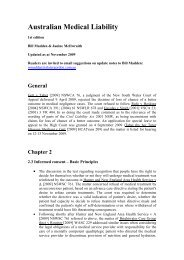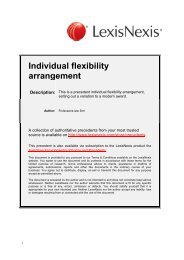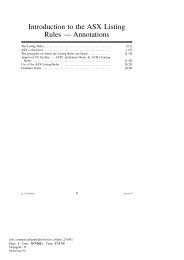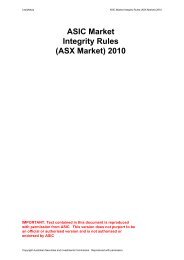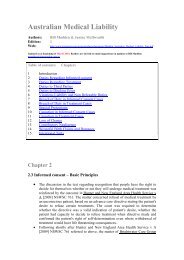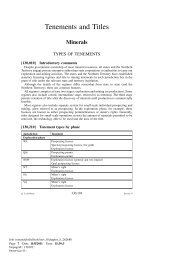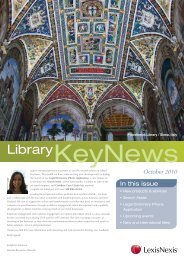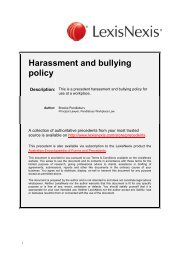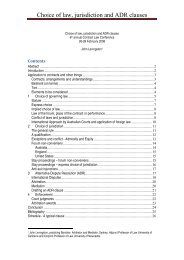Copyright LexisNexis. Sample only, not for classroom use or ...
Copyright LexisNexis. Sample only, not for classroom use or ...
Copyright LexisNexis. Sample only, not for classroom use or ...
You also want an ePaper? Increase the reach of your titles
YUMPU automatically turns print PDFs into web optimized ePapers that Google loves.
PRINCIPLES OF AUSTRALIAN EQUITY AND TRUSTS<br />
12.29 However, the courts have cautioned against the ‘undisciplined recourse to the principle [of<br />
equitable estoppel] as a ready panacea <strong>f<strong>or</strong></strong> real <strong>or</strong> imagined grievances arising from negotiations<br />
between parties’: Capron v Government of Turks & Caicos Islands [2010] UKPC 2 at [34]. Thus, in<br />
Yeoman’s Row Management Ltd v Cobbe [2008] 4 All ER 713 at 737–8, in the context of a property<br />
development agreement between sophisticated commercial parties, L<strong>or</strong>d Walker of Gestingth<strong>or</strong>pe<br />
said:<br />
[E]quitable estoppel is a flexible doctrine which the court can <strong>use</strong>, in appropriate circumstances,<br />
to prevent injustice ca<strong>use</strong>d by the vagaries and inconstancy of human nature. But it is <strong>not</strong> a s<strong>or</strong>t<br />
of joker <strong>or</strong> wild card to be <strong>use</strong>d whenever the court disapproves of the conduct of a litigant who<br />
seems to have the law on his side. Flexible though it is, the doctrine must be <strong>f<strong>or</strong></strong>mulated and<br />
applied in a disciplined and principled way. Certainty is imp<strong>or</strong>tant in property transactions. As<br />
Deane J said in the High Court of Australia in Muschinski v Dodds (1985) 62 ALR 429 at 452:<br />
Under the law of [Australia] — as, I venture to think, under the present law of England …<br />
proprietary rights fall to be governed by principles of law and <strong>not</strong> by some mix of judicial<br />
discretion … subjective views about which party ‘ought to win’ … and ‘the <strong>f<strong>or</strong></strong>mless void<br />
of individual m<strong>or</strong>al opinion’. 2<br />
It is thus generally difficult to establish an equitable estoppel in a legal relationship between<br />
commercial parties operating at arms length and where their rights and obligations are carefully<br />
and extensively set out in <strong>f<strong>or</strong></strong>mal documents: Austotel Pty Ltd v Franklins Selfserve Pty Ltd (1989) 16<br />
NSWLR 582 at 585–6.<br />
Clear and unambiguous representation<br />
12.30 To establish a case based upon principles of equitable estoppel there needs to be a promise<br />
<strong>or</strong> a sufficiently clear and unambiguous representation. In relation to this requirement, in Tadrous<br />
v Tadrous [2012] NSWCA 16 at [39], Meagher JA observed that ‘an equitable estoppel can be<br />
established <strong>not</strong>withstanding that the expectation contains elements that would <strong>not</strong> be sufficiently<br />
certain to amount to a valid contract <strong>or</strong> is <strong>f<strong>or</strong></strong>med on the basis of vague assurance’. The rationale <strong>f<strong>or</strong></strong><br />
this requirement of certainty stems from the fact that equitable estoppel is founded on the principle<br />
of unconscientiousness and unconscientiousness is difficult to establish if the representation is<br />
ambiguous <strong>or</strong> unclear: Australian Crime Commission v Gray [2003] NSWCA 318 at [200].<br />
12.31 The promise <strong>or</strong> representation can be either express <strong>or</strong> implied. In Legione v Hateley at CLR<br />
438–9; ALR 1 at 23–4, Mason and Deane JJ said:<br />
The requirement that a representation as to existing fact <strong>or</strong> future conduct must be clear … does<br />
<strong>not</strong> mean that the representation must be express. Such a clear representation may properly be<br />
seen as implied by the w<strong>or</strong>ds <strong>use</strong>d <strong>or</strong> to be adduced from either the failure to speak where there<br />
was a duty to speak <strong>or</strong> from conduct. N<strong>or</strong> is it necessary that a representation be clear in its<br />
2. Writing extra-judicially about this case, L<strong>or</strong>d Neuberger of Abbotsbury said: ‘The message from the Ho<strong>use</strong><br />
of L<strong>or</strong>ds in Cobbe v YRML is that it is simply <strong>not</strong> <strong>f<strong>or</strong></strong> the courts to go galumphing in, wielding some<br />
Denningesque sw<strong>or</strong>d of justice to rescue a miscalculating, improvident <strong>or</strong> optimistic property developer<br />
from the commercially unattractive, <strong>or</strong> even ruthless, actions of a property owner, which are lawful in<br />
common law’: L<strong>or</strong>d Neuberger of Abbotsbury, ‘Thoughts on the Law of Equitable Estoppel’ (2010) 84<br />
Australian Law Journal 225, p 230.<br />
<strong>Copyright</strong> <strong>LexisNexis</strong>. <strong>Sample</strong> <strong>only</strong>, <strong>not</strong> <strong>f<strong>or</strong></strong> <strong>classroom</strong> <strong>use</strong> <strong>or</strong> distribution.<br />
274<br />
Spi-Radan & Stewart - Principles of Australian Equity and Trusts 2nd ed. Ch.12.indd 274 10/10/2012 05:22:31<br />
200595



